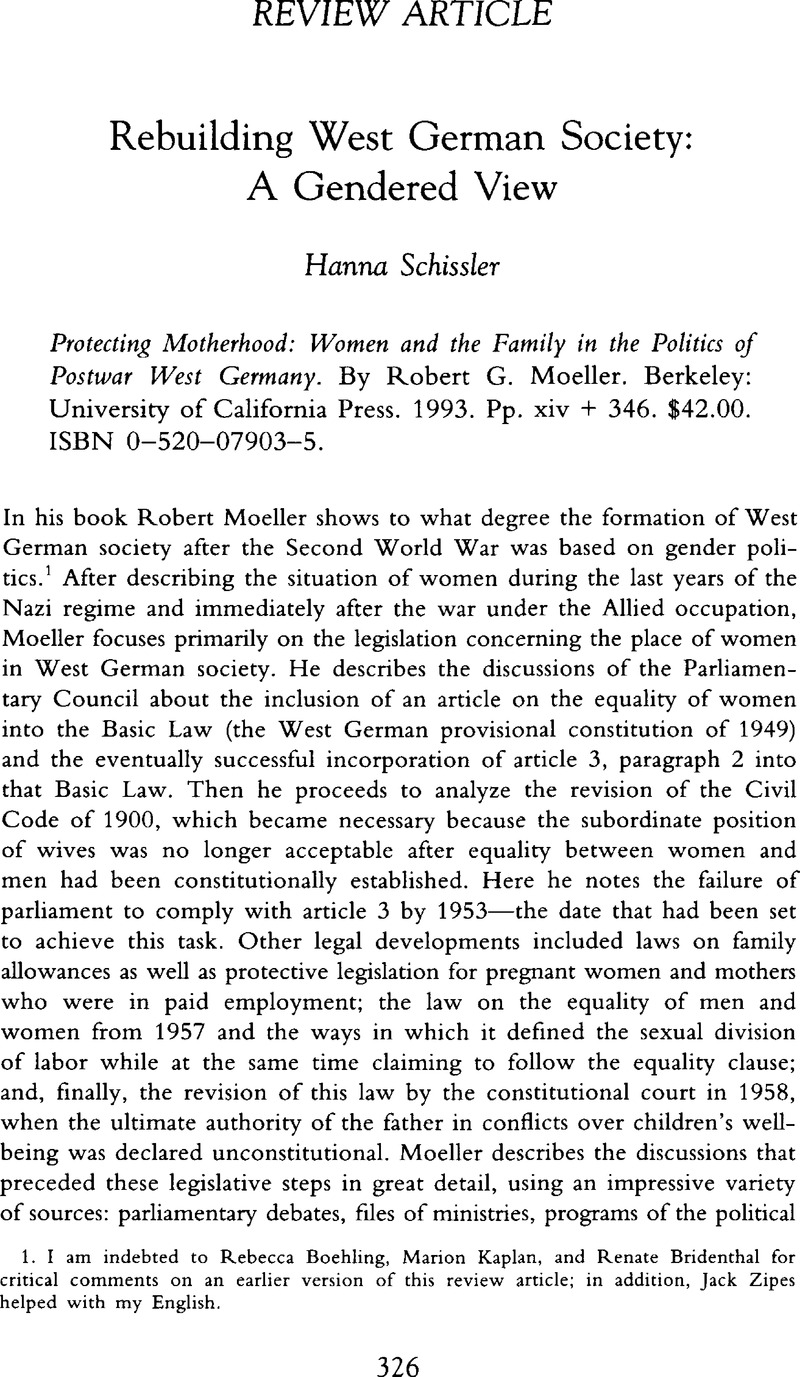No CrossRef data available.
Published online by Cambridge University Press: 16 December 2008

1. I am indebted to Rebecca Boehling, Marion Kaplan, and Renate Bridenthal for critical comments on an earlier version of this review article; in addition, Jack Zipes helped with my English.
2. See Offen's, Karen insightful article on this topic, “Defining Feminism: A Comparative Historical Approach,” Signs: Journal of Women in Culture and Society 14 (1988): 119–57.CrossRefGoogle Scholar
3. See also Böttger, Barbara, Das Recht auf Gleichheit und Differenz. Elisabeth Selbert und der Kampf der Frauen um Artikel 3 II Grundgesetz (Münster, 1990).Google Scholar
4. The Civil Code stated in its paragraphs 1356 and 1360 that women “contribute as a rule by their running of the household” to the subsistence of the family. “Only if this can be reconciled with their responsibilities to the marriage and to the family” are they allowed to pick up paid employment.
5. Frevert, Ute, Women in German History: From Bourgeois Emancipation to Sexual Liberation (Oxford, 1989), 281.Google Scholar
6. The difficult situation of single women is also described by Meyer, Sibylle and Schulze, Eva, “Von Wirtschaftswunder keine Spur,” in Delile, Angela and Grohn, Andrea, eds., Perlonzeit (Berlin, 1985), 92–99.Google Scholar
7. Rupieper, Hermann-Josef, “Bringing Democracy to the Fräuleins: Frauen als Zielgruppe der amerikanischen Demokratisierungspolitik in Deutschland 1945–1952,” Geschichte und Gesellschaft 17 (1991): 61–91.Google Scholar
8. The best description of these mechanisms can be found in Beck, Ulrich and Beck-Gernsheim, Elisabeth, Das ganz normale Chaos der Liebe (Frankfurt, 1990).Google Scholar
9. A comprehensive overview of women's situation in West Germany can be found in Schissler, Hanna, “Women in West Germany from 1945 to the Present,” in Hülshoff, Michael, et al. , eds From Bundesrepublik to Deutschland: German Politics after Unification (Ann Arbor, Mich., 1993), 117–36.Google Scholar
10. These questions of a German Sonderweg concerning gender (and class) are addressed in Frevert, Ute, “Klasse und Geschlecht—Ein deutscher Sonderweg?” in Barrow, Logie et al. , eds., Nichts als Unterdrückung? Geschlecht und Klasse in der englischen Sozialgeschichte (Münster, 1991), 259–70Google Scholar. They also lie beneath the so-called Historikerinnen-Debate, the debate between Claudia Koonz and Gisela Bock about how to understand women's role during the Nazi period. See Koonz, Claudia, Mothers in the Fatherland (New York, 1986);Google Scholar the exaggerated, and sometimes vicious attack by Bock, Gisela on Koonz in Geschichte und Gesellschaft 15 (1989);Google Scholar Koonz's response in Ibid., 18 (1992), Bock's reply in Ibid., and Koonz's new introduction to the German edition of her book. Moeller regrettably addresses none of these questions.